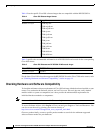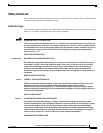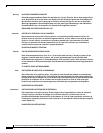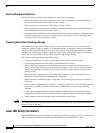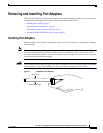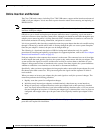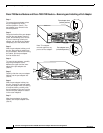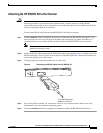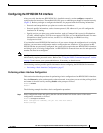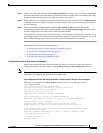
22
PA-4C-E 1-Port High-Performance ESCON Channel Port Adapter Installation and Configuration
OL-3743-02
Removing and Installing Port Adapters
Online Insertion and Removal
The Cisco 7200 series routers, including Cisco 7200 VXR routers, support online insertion and removal
(OIR) of all port adapters. You do not need to power down the router when removing and replacing an
HP ESCON PA.
Note As you disengage the module from the router or switch, OIR administratively shuts down all active
interfaces in the port adapter.
OIR allows you to install and replace port adapters while the router is operating; you do not need to
notify the software or shut down the system power, although you should not run traffic through the port
adapter you are removing while it is being removed. OIR is a method that is seamless to end users on
the network, maintains all routing information, and preserves sessions.
It is wise to gracefully shut down the system before removing a port adapter that has active traffic moving
through it. Removing a module while traffic is flowing through the ports can cause system disruption.
Once the port adapter is inserted, the ports can be brought back up.
The following is a functional description of OIR for background information only; for specific
procedures for installing and replacing a port adapter in a supported platform, refer to the “Port Adapter
Removal and Installation” section on page 23.
Each port adapter has a bus connector that connects it to the router. The connector has a set of tiered pins
in three lengths that send specific signals to the system as they make contact with the port adapter. The
system assesses the signals it receives and the order in which it receives them to determine if a port
adapter is being removed from or introduced to the system. From these signals, the system determines
whether to reinitialize a new interface or to shut down a disconnected interface.
Specifically, when you insert a port adapter, the longest pins make contact with the port adapter first, and
the shortest pins make contact last. The system recognizes the signals and the sequence in which it
receives them.
When you remove or insert a port adapter, the pins send signals to notify the system of changes. The
router then performs the following procedure:
1. Rapidly scans the system for configuration changes.
2. Initializes newly inserted port adapters or administratively shuts down any vacant interfaces.
3. Brings all previously configured interfaces on the port adapter back to their previously installed
state. Any newly inserted interface is put in the administratively shutdown state, as if it was present
(but not configured) at boot time. If a similar port adapter type is reinserted into a slot, its ports are
configured and brought online up to the port count of the originally installed port adapter of that
type.
Note Before you begin installation, read the “Required Tools and Equipment” section on page 12 for a list of
parts and tools required for installation.



